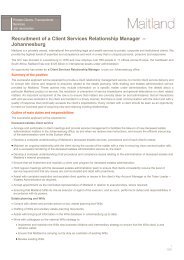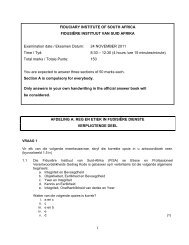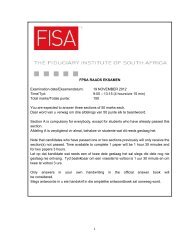Ngwenyama v Mayelane wedding after customary wedding
Ngwenyama v Mayelane wedding after customary wedding
Ngwenyama v Mayelane wedding after customary wedding
You also want an ePaper? Increase the reach of your titles
YUMPU automatically turns print PDFs into web optimized ePapers that Google loves.
11<br />
subsequent <strong>customary</strong> marriage, the second wife also acquires certain<br />
rights. He further questioned why the second wife s hould be penalised or<br />
prejudiced on account of the failure of the husband to comply with the<br />
requirements of s 7(6), more so when the Act does n ot contain an express<br />
provision invalidating <strong>customary</strong> marriages contracted without compliance<br />
with the section. He held that the section could no t be interpreted as<br />
invalidating an otherwise valid <strong>customary</strong> marriage.<br />
[18] The respondent relied on the judgment of Dlodl o J in Mrapukana v<br />
Master of the High Court 14 wherein the court stated, albeit obiter, that a m an<br />
who seeks to enter into a further <strong>customary</strong> marriag e must first enter into a<br />
written agreement that will set out the manner in w hich the material<br />
possession and wealth of the family will be managed . Stated differently, the<br />
contract is a prerequisite for the validity of the further <strong>customary</strong> marriage.<br />
This statement is no more than a restatement of the section as Dlodlo J<br />
understood it. Dlodlo J did not consider the impact of s 7(6) as it was not an<br />
issue before him. Any reliance on this judgment is therefore misplaced.<br />
Conclusion<br />
[19] The purpose of the section must be determined in the light of the<br />
legislative scheme which guided its promulgation. A t the heart of the Act, is<br />
the intention to advance the rights of women marrie d according <strong>customary</strong><br />
law in order that they acquire rights to matrimonia l property they did not have<br />
before the enactment of the Act. Effectively, the Act seeks to realise the right<br />
to equality envisaged in the Bill of Rights. With t his in mind, it becomes<br />
difficult to reason that s 7 (6) could be intended solely for the protection of the<br />
wife in an existing marriage. The court a quo corre ctly considered and<br />
acknowledged that the equal status and capacity aff orded to spouses in a<br />
<strong>customary</strong> marriage and came to the conclusion that s 7(6) is aimed at<br />
protecting the proprietary interests of both the ex isting and prospective<br />
spouse, but failed to afford a purposive interpreta tion to the section so that<br />
14 Mrapukana v Master of the High Court & another [2008] JOL 22875 (C).



![Motsepe v Khoza customary marriage and child[3]](https://img.yumpu.com/44777240/1/184x260/motsepe-v-khoza-customary-marriage-and-child3.jpg?quality=85)


